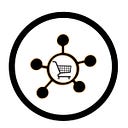Pricepally’s alternative for Nigerians dealing with electricity problems
Happy Thursday! 🌞
For some families in Nigeria, cooking with gas might become a luxury. Last June, in Lagos, you could fill a 12.5kg cylinder for about ₦4,750. Today? Hold your ₦9,400. The question is, will families be able to sustain themselves with the skyrocketing prices emerging every month?
In today’s Edition:
- Pricepally’s alternative for Nigerians dealing with electricity problems
- FG asked to suspend the 15% grain import levy.
- The cost of cooking gas skyrockets in May 2022
- This Strategic Partnership with Giz will help Pricepally subsidize tomato prices in the coming months.
- Heifer Announces USD 3.5M Funding to Boost Agriculture in Nigeria
- Kenyan Based Aquaculture Victory Farms Receives USD 5M Funding to Expand into New Markets
Pricepally’s alternative for Nigerians dealing with electricity problems
Buying in bulk tends to save money, but buying large quantities of food during power outages can lead to waste. Pricepally’s retail option allows customers to SHOP items such as a paint bucket of tomatoes, pepper, and other lesser things from the comfort of their residences and offices at wholesale prices without worrying about making that next market trip.
Delivery is N1000 anywhere in Lagos & Abuja and N500 in Port Harcourt.
Strategic Partnership with Giz will help Pricepally subsidize Tomato & Pepper prices in the coming months.
In Pricepally’s commitment to ensuring its users have access to quality and affordable fresh foods all year round, the company has teamed up with GIZ — a cooperation that positions and strategizes for promoting a socially acceptable, environmentally friendly, and competitive agriculture and food sector.
What does this mean?
For Pricepally users, the cost of tomatoes and pepper will not experience a usual increase, especially now that the staple is going out of season. Unlike other consumers shopping from local markets, Pricepally users are assured of the best prices and quality all season.
The cost of cooking gas skyrockets in May 2022
The cost of purchasing a 12.5kg cylinder of household cooking gas in Nigeria has increased from N7,000 in September 2021 to N9,400, as of May 31, 2022,
Nigeria is endowed with natural gas but lacks the production capacity to produce enough cooking gas. So, we import 60% of our domestic gas while Nigerian Liquified Natural Gas (NLNG) supplies the rest. According to Business Day, the rise in cooking gas prices can be attributed to the absence of infrastructure, the global shortfall in gas supply, inadequate local production, shortage of foreign exchange, devaluation of the Naira, and logistic hitches.
When prices of goods and services increase, either the value of the goods has increased, or your money no longer packs a punch. The continuous hike in the price of cooking gas coupled with the dwindling purchasing power of the average Nigerian is not only bad for the economy. Still, it spirals the population below the poverty line making life unbearable for most.
For some families in Nigeria, cooking with gas is becoming a luxury. The question is, will families be able to sustain themselves with the skyrocketing prices emerging every month?
FG asked to suspend the 15% grain import levy.
The SBM reports that Industry stakeholders have called on the federal government to suspend the 15 percent levy imposed on wheat grain importation to avert production and a significant food inflation crisis. The stakeholders made the call in a recent report on the global wheat market following the war between the two top wheat exporting countries — Russia and Ukraine.
Considering the crisis in Ukraine and the global food crisis, the stakeholders called on the Nigerian government to reconsider the removal of the 15 percent wheat import levy as “this is necessary to prevent a wider supply chain breakdown and recession.” Measures proposed by the stakeholders to help the millers, bakers, and consumers include increased access to forex at the import and export (I&E) window, allowance for tax concessions in line with the critical backward integration programs index, and the provision of logistic support. Read more
Heifer Announces USD 3.5M Funding to Boost Agriculture in Nigeria
On Wednesday, international development organization Heifer International announced an additional USD 3.5M funding for its tractor financing initiative in Nigeria and other African countries to speed up agricultural development. The investment comes two weeks after the launch of Hello Tractor’s innovative Pay-As-You-Go (PAYG) tractor financing for agri-entrepreneurs in Nigeria with USD 1M from Heifer International organization’s investment in catalytic funding for tractor financing in Africa to USD 4.5M.
Kenyan Based Aquaculture Victory Farms Receives USD 5M Funding to Expand into New Markets
Victory Farms, an aquaculture startup, and farm for tilapia fish comprising hatcheries, nursery ponds, and deep-water cages, has raised USD 5M in new funding. The investment was led by Ed Brakeman, a senior managing director at Bain Capital, and Hans den Bieman, founder and ex-CEO of Mowi, one of the largest salmon businesses globally. This funding will allow the Kenyan-based company to expand its business into Rwanda, DRC, and Tanzania.
Events
International Exhibition & Conference on Agriculture Technology 15th — 17th June 2022, Kenyatta International Convention Centre, Nairobi, Kenya
